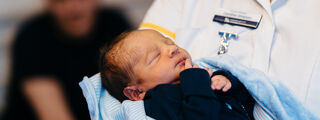One in four women has a caesarean section. Most women recover quickly and without complications. However, some women develop an infection; this may be inside the womb, in the scar on the skin or a severe infection that is present in the blood stream. Developing an infection makes the women's recovery following caesarean more difficult and complicated. Researchers at Birmingham City University designed a study aiming to reduce the number of women that develop infection after a caesarean section.
The PREPS Trial (Vaginal Preparation at caesarean section to Reduce Endometritis and Prevent Sepsis – a feasibility study of Chlorhexidine Gluconate) explored ways of reducing infections after caesarean section (C-section) and included a qualitative study focused on developing women-centred outcomes of wellbeing after delivery.
Infections following c-section contribute to maternal morbidity and mortality. PREPs included the first qualitative study, conducted by Professor Annalise Weckesser, focused on women’s c-section recovery in relation to infection and infection prevention.
Professor Annalise Weckesser found women undergoing c-sections need more information about what constitutes a ‘normal’ post-operative recovery as well as infection prevention information provided in a written format (rather than verbally post-surgery). Her study further evidenced how c-section stigma, and women’s feelings of guilt for needing them, negatively affected their recovery experiences.
Improving local maternal health and infant wellbeing
Research findings informed Birmingham Women and Children’s Hospital’s quality improvement initiative to prevent infections post c-section and to improve information provision for women. This initiative was implemented from January 2019 and “by January 2020 the SSI (surgical site infection) rate had decreased by 10%”.
A reduction of significance as the hospital’s SSI rate (21.08%) was twice that of the national average (9.6%) in 2018. Birmingham Women and Children’s hospital delivers an average of 8,200 babies a year; approximately 30% of deliveries are by c-section as the hospital attracts high-risk pregnancies from across the region. SSIs contribute to maternal morbidity and mortality and disrupt postnatal recovery, breastfeeding and infant-parent attachment. Reduced SSI rates are key to improving maternal health and infant wellbeing.
Combatting “C-Section Guilt”
Professor Annalise Weckesser featured in a BBC educational video ‘C-Section Guilt: I felt like I’d failed’, sharing PREPS findings on women’s experiences of stigma and guilt following caesarean section. The BBC’s Senior Broadcast Journalist who produced the video stated: “[The BBC] measures success with the discussion arising from the content as this means the audience was really engaged with the video. There were thousands of comments from women who said this video changed their perspective and made them feel less alone”. In September 2020, the video broadcasted on the BBC website, News Channel and social media outlets and “received 1,761,400 views across the BBC UK and international facing website, Facebook, Twitter and Instagram”.
Project Team:
- Professor Annalise Weckesser led the Qualitative Study of PREPS
- Bid held by University of Birmingham, Chief Investigator Prof Katie Morris
- External co-investigators Dr Victoria Hodgetts Morton, Miss Sharon Morad, Mrs Catherine Alexandra Moakes, Ms Pollyanna Hardy, Professor David Lissauer
- This research was sponsored by Birmingham Women's and Children's NHS Foundation Trust
Publications:
- Weckesser A, Farmer N, Dam R, Wilson A, Morton VH, Morris RK. Women’s perspectives on caesarean section recovery, infection and the PREPS trial: a qualitative pilot study. BMC Pregnancy and Childbirth. 2019;19(1):245.
- Morton VH, Hewitt CA, Wilson A, Farmer N, Weckesser A, et al. Vaginal preparation with chlorhexidine at cesarean section to reduce endometritis and prevent sepsis: A randomized pilot trial (PREPS). Acta Obstet Gynecol Scand. 2020; 99:231-239.
- BBC special video on, featuring Prof A Weckesser: C-section guilt: ‘I felt like I’d failed’ - BBC News
